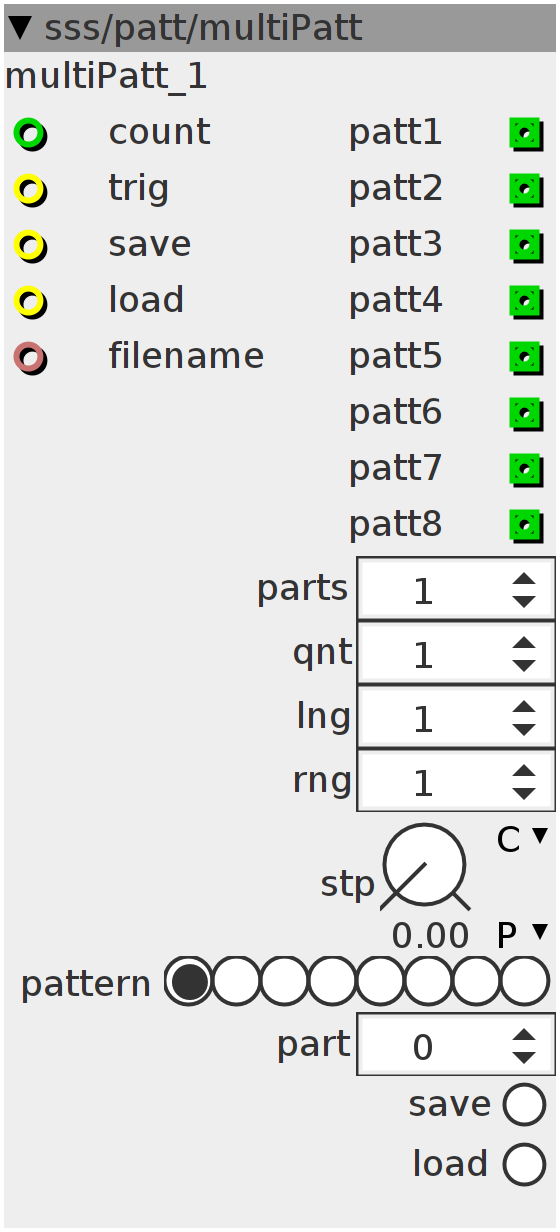multiPatt
Generates 8 patterns based on euclidian functions. Each pattern can have multiple "parts"(attribute) that influence the pattern. Using "pattern", you select which pattern to adjust. Using "part" (parameter) you select which part of the selected pattern you'ld like to adjust. (max set by attribute) "qnt" sets the amount of steps it takes before a new value will be generated. "lng" sets the length of the part after which it will repeat itself until count restarts. "rng" sets the maximum level that the part can reach. Note also, that the individual parts get summed, thus total range is the sum of the ranges of all parts. "stp" sets the stepsize of each step, skipping intermediate steps. (wrapped by "rng") with these 4 controls and the pattern and part controls, you can set all parts of all patterns. Combing different "qnt" values will result in interesting rhythms. This module combines very well with the "songnotes" module.
Inlets
int32 count
bool32 trig
bool32 save
bool32 load
charptr32 filename
Outlets
int32 patt1
int32 patt2
int32 patt3
int32 patt4
int32 patt5
int32 patt6
int32 patt7
int32 patt8
Parameters
int32.hradio pattern
bool32.mom save
bool32.mom load
int32 qnt
int32 lng
int32 rng
int32 part
frac32.u.map stp
Attributes
spinner parts
static const uint32_t LENGTH = 32 * attr_parts;
int32_t *array;
int gtrig;
int32_t prev;
int i;
int j;
int32_t count;
int32_t COUNTER(int32_t cnt, int qnt, int lng, int rng, int stp) {
count = cnt / qnt;
count = count - count / lng * lng;
stp = ___SMMUL(stp << 3, rng << 18);
count = count * stp;
count = count >> 16;
count = count - count / rng * rng;
count = count < 0 ? count + rng : count;
}
int32_t temp[8];
int strig;
int ltrig;static int32_t _array[LENGTH] __attribute__((section(".sdram")));
array = &_array[0];
// for(i=0;i<LENGTH;i++){array[i]=1;}int save = inlet_save + param_save;
if ((save > 0) && !strig) {
strig = 1;
FIL FileObject;
FRESULT err;
UINT bytes_written;
err = f_open(&FileObject, inlet_filename, FA_WRITE | FA_CREATE_ALWAYS);
if (err != FR_OK) {
report_fatfs_error(err, "inlet_filename");
return;
}
int rem_sz = sizeof(*array) * LENGTH;
int offset = 0;
while (rem_sz > 0) {
if (rem_sz > sizeof(fbuff)) {
memcpy((char *)fbuff, (char *)(&array[0]) + offset, sizeof(fbuff));
err = f_write(&FileObject, fbuff, sizeof(fbuff), &bytes_written);
rem_sz -= sizeof(fbuff);
offset += sizeof(fbuff);
} else {
memcpy((char *)fbuff, (char *)(&array[0]) + offset, rem_sz);
err = f_write(&FileObject, fbuff, rem_sz, &bytes_written);
rem_sz = 0;
}
}
if (err != FR_OK)
report_fatfs_error(err, "inlet_filename");
err = f_close(&FileObject);
if (err != FR_OK)
report_fatfs_error(err, "inlet_filename");
} else if (!(save > 0)) {
strig = 0;
}
int load = param_load + inlet_load;
if ((load > 0) && !ltrig) {
ltrig = 1;
FIL FileObject;
FRESULT err;
UINT bytes_read;
err = f_open(&FileObject, inlet_filename, FA_READ | FA_OPEN_EXISTING);
if (err != FR_OK) {
report_fatfs_error(err, inlet_filename);
return;
}
int rem_sz = sizeof(*array) * LENGTH;
int offset = 0;
while (rem_sz > 0) {
if (rem_sz > sizeof(fbuff)) {
err = f_read(&FileObject, fbuff, sizeof(fbuff), &bytes_read);
if (bytes_read == 0)
break;
memcpy((char *)(&array[0]) + offset, (char *)fbuff, bytes_read);
rem_sz -= bytes_read;
offset += bytes_read;
} else {
err = f_read(&FileObject, fbuff, rem_sz, &bytes_read);
memcpy((char *)(&array[0]) + offset, (char *)fbuff, bytes_read);
rem_sz = 0;
}
}
if (err != FR_OK) {
report_fatfs_error(err, inlet_filename);
return;
};
err = f_close(&FileObject);
if (err != FR_OK) {
report_fatfs_error(err, inlet_filename);
return;
};
} else if (!(load > 0)) {
ltrig = 0;
}
if (param_part >= attr_parts) {
PExParameterChange(&parent->PExch[PARAM_INDEX_attr_legal_name_part],
attr_parts - 1, 0xFFFD);
}
int32_t part = param_part * 32;
int32_t param = param_pattern << 2;
int32_t patt = param + part;
if (!(prev == patt)) {
PExParameterChange(&parent->PExch[PARAM_INDEX_attr_legal_name_qnt],
array[patt], 0xFFFD);
PExParameterChange(&parent->PExch[PARAM_INDEX_attr_legal_name_lng],
array[patt + 1], 0xFFFD);
PExParameterChange(&parent->PExch[PARAM_INDEX_attr_legal_name_rng],
array[patt + 2], 0xFFFD);
PExParameterChange(&parent->PExch[PARAM_INDEX_attr_legal_name_stp],
array[patt + 3], 0xFFFD);
}
if ((inlet_trig > 0) && !gtrig) {
array[patt] = param_qnt;
array[patt + 1] = param_lng;
array[patt + 2] = param_rng;
array[patt + 3] = param_stp;
for (i = 0; i < 8; i++) {
temp[i] = 0;
}
for (j = 0; j < 8; j++) {
for (i = 0; i < attr_parts; i++) {
COUNTER(inlet_count, array[(j << 2) + (i << 5)],
array[(j << 2) + (i << 5) + 1], array[(j << 2) + (i << 5) + 2],
array[(j << 2) + (i << 5) + 3]);
temp[j] += count;
}
}
gtrig = 1;
} else if (inlet_trig == 0) {
gtrig = 0;
}
outlet_patt1 = temp[0];
outlet_patt2 = temp[1];
outlet_patt3 = temp[2];
outlet_patt4 = temp[3];
outlet_patt5 = temp[4];
outlet_patt6 = temp[5];
outlet_patt7 = temp[6];
outlet_patt8 = temp[7];
prev = patt;